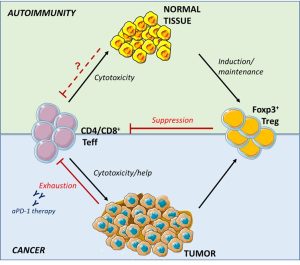Molecular regulation of cancer immunity

Objectives
Cancer progression is often indexed to the quality of the anti-tumor immune response. Conversely, these immune responses can be deleterious in the settings of autoimmune diseases. In this context, understanding the molecular mechanisms orchestrating the function of immune cells in their target tissues, is of major interest for the development of new therapies for cancer and autoimmunity. The team “Molecular Regulation of Cancer Immunity” is particularly interested in the role of the NF-kB family of transcription factors in the biology of different T-cell subsets. Our work spans from fundamental studies (regulation of chromatin accessibility and transcription by NF-kB) to therapeutic applications (checkpoint inhibitors, CAR-T cells).

Projects
The research of the team is articulated around 3 axes:
-The characterization of NF-kB subunits in immune responses to cancer
-NF-kB in autoimmune diseases
-The identification of novel immunotherapeutic targets, in particular in hematological malignancies.
-
Yenkel GRINBERG-BLEYER
Chef d’équipe, CRCN InsermCheney B, 4th floor